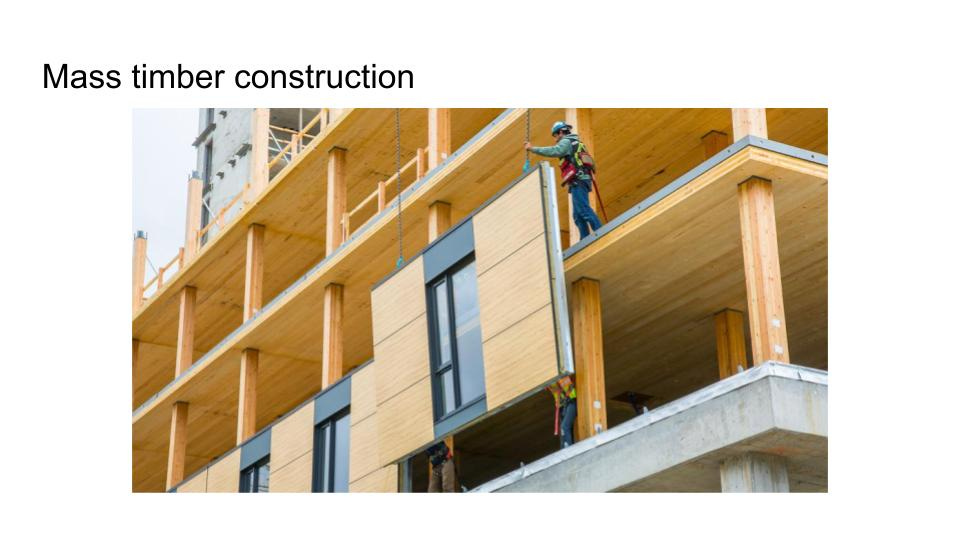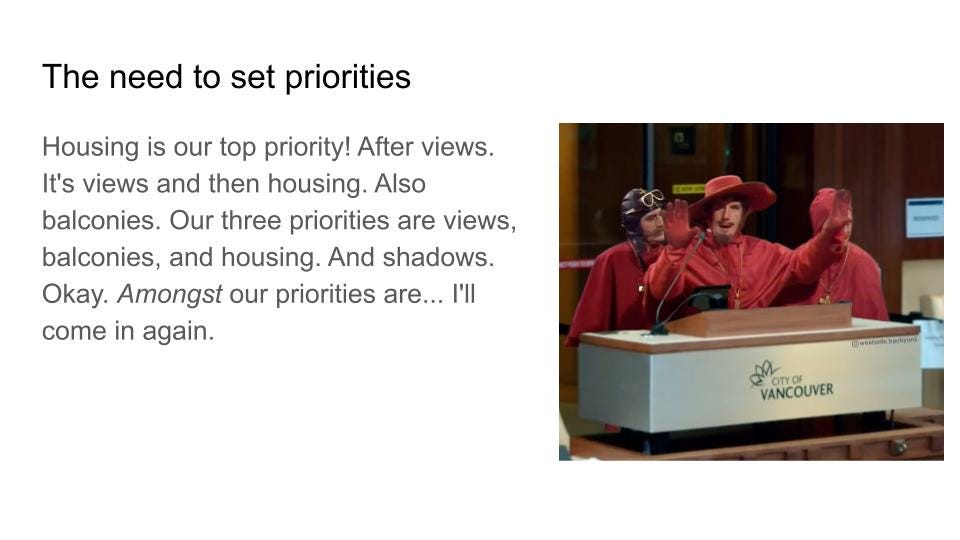Speaking notes for 2015 Main Street
Every regulatory requirement is higher-priority than new housing
The January 23 public hearing for the 2015 Main Street rezoning was recessed until tonight. I’m planning to speak.
Hello, my name is Russil Wvong. I’m here to speak in support of the 2015 Main Street rezoning, and also to support the city waiving the requirement for balconies for this mass timber project.
Housing in Vancouver is terribly scarce and expensive, making everyone worse off. This project will add 210 purpose-built rental apartments, with 20% non-market. It’s 500 metres from a new SkyTrain station, and the 25-storey height is consistent with the Broadway Plan for this particular zone. There’s no displacement of existing renters. As always, adding more new housing frees up existing housing. When it’s occupied, that’ll be 210 fewer households competing with everyone else to try to find a place to live.
This project will be mass timber, with cross-laminated slabs of wood forming massive beams that can match the performance of concrete and steel. This has two advantages. One is that construction is much faster, because materials can be fabricated precisely off-site, and then assembled quickly on-site. Another is that there’s much less carbon emissions compared to concrete.
Cross-laminated timber originated in Europe. In North America, it’s relatively new, so we don’t have a lot of experience with it, but it appears to be worth pursuing. The other local example of a high-rise mass timber building is Brock Commons at UBC, completed in 2017. If you ask people what it’s like to live in Brock Commons, they say that it’s basically like living in any other high-rise.
It makes sense to me to support the architect’s request to waive the requirement for each apartment to have its own private balcony. This would mean punching a lot of holes into the building envelope, increasing the risk of water intrusion. If city council isn’t willing to waive the requirement, it sounds like the project will need to switch to concrete construction to reduce the risk, which will require a lot of expensive rework.
I’m wondering why the city needs to mandate balconies in the first place. People like balconies, and they’re willing to pay about 10% more to live in an apartment with a balcony. So why not just leave it to the project and to future renters to figure out if it makes sense to include a balcony or not? This isn’t something that’s difficult for a layperson to judge. It’s not like food or water safety. Nobody’s going to rent an apartment without a balcony and then say, hey, wait a minute, I thought this place had a balcony!
I understand that city council is looking for ways to reduce costs. Having a balcony mandate means that city staff have to spend a lot of time enforcing it and negotiating possible waivers. This is very labour-intensive, and therefore expensive.
This is only one of many, many regulations that the city has in place. The general principle here is that there’s no such thing as a free lunch. Someone has to pay for all this work. When city staff are spending a lot of time enforcing these regulations, it’s either paid by taxpayers, or the costs are recovered and charged to the project, which means that rents will need to be higher.
I would suggest that the city should exercise restraint in adding new regulatory requirements. This is really critical because satisfying each regulatory requirement is always higher-priority than getting new housing built. It doesn’t matter if it’s to protect birds, or trees, or shadows, or what. Until each and every requirement on the list is satisfied, approval cannot be granted. So every time you add a new regulatory requirement, housing goes further down the list of priorities.
There’s a major cost-saving opportunity here for the city to review and prioritize its long list of existing regulations, and to recommend lower-priority ones for removal.
Thank you for your time.
More
What people think of living in Brock Commons. “Most people in Brock Commons don’t even know they are in a mass timber building. Living in it is the same as living in any other building.”
Apartment amenities. Paige Saunders did an online poll and found that people would be willing to pay about 12% less to buy an apartment with no balcony.
C Bailey summarized comments from a planner at a Toronto public hearing as: “Housing is our top priority! After vegetable gardens. It's vegetable gardens and then housing. Unless there's a neighbouring backyard pool. Our three priorities are vegetables, pools, housing. And oversalted sidewalks. Okay. *Amongst* our priorities are... I'll come in again.” From the Monty Python “Spanish Inquistion” sketch.
The meme is by Westside Backyard on Twitter.




That's really great. I never knew about the balcony thing. That's obviously a massive task incorporate balconies into every residential project. I do quality control on residential projects, and so much of my time is reviewing detailing around balconies and the building envelope reports that go along with them.
I did not realize there is a balcony requirement lol... With idiotic red tape like these no wonder we have housing shortage.